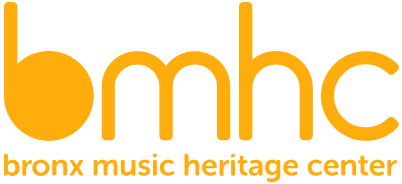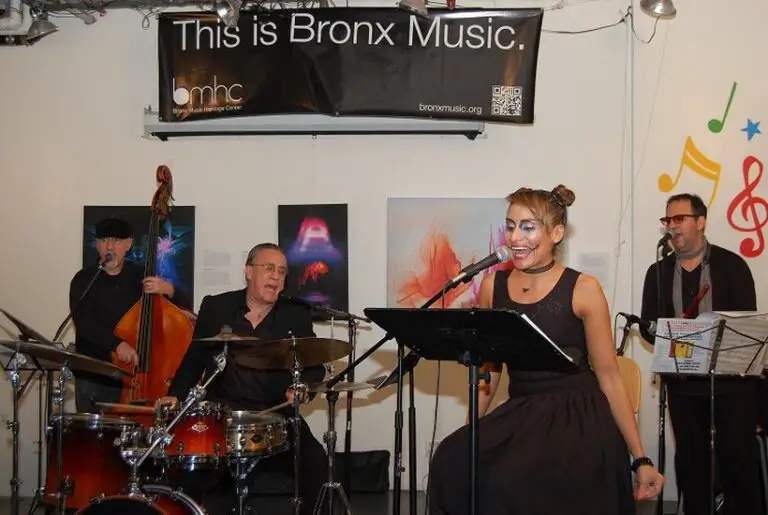The Bronx Music Heritage Center has announced the return of their signature Bronx Rising! with the addition of various music performances, a film screening, and moderated conversations exploring Congolese influences in Caribbean music and dance. Bronx Rising! is set to begin on June 24th and will stretch to the end of August with three Congolese events scattered throughout.

Bronx Rising! is an annual series that brings the Bronx’s cultural riches, past and present, to life. The kick-off event on June 24th will begin the Congolese series with ‘The Congo Influence in Puerto Rican Bomba’ at 3:00 PM in the Bronx Music Hall Plaza. This conversation will be open to the public and be presented by musical artist Nkumu Katalay and Alex LaSalle, bandleader of the Afro-Puerto Rican Alma Moyo, followed by a performance of both their ensembles.
The next event in the series will take a different direction in exploring Congolese influence as it will feature a special screening of “Kumina Queen.” The film follows Imogene Queenie Kennedy, a priestess in post-colonial Jamaica, as she shares the African spiritual practices of Kumina with the world. Kumina’s basic elements are song, dance, and trance possession which is a driving force in Jamaica’s culture and identity as the music and rhythms employed during Kumina ceremonies have heavily influenced Jamaican popular music including reggae and dancehall. Today, artists such as Nyasha Laing, the film’s director, producer, and screenplay writer, are reimagining Kumina in part because of the constantly changing mysteries of spirit possession. Taking place on July 22nd at 7:00 PM in the BMHC Lab, the event will continue with a moderated discussion and Q&A with Laing and anthropologist Dr. Kenneth Bilby pertaining to the Congo influence present in popular Jamaican music. Tickets for the event will be sold for $10 for adults and $5 for students and seniors.
On August 26th, the series will conclude back at the Bronx Music Hall Plaza with ‘Congo Roots in the Diaspora: “Quien no tiene de Kongo tiene de Karabal픑 which will feature a performance by the Román Díaz Ensemble. Román Díaz himself will remain after the free performance to converse with cultural historian Dr. Ivor Miller and BMHC co-artistic director Bobby Sanabria. The men will examine how Congolese influences have shaped Cuban traditions thus producing some of the most famous performance ensembles of the island.

Despite having such a large impact, Congolese influences and connections have been emphasized less both in the music world and within the Latin American and Caribbean communities in the United States, but their presence pervades many of the music, dance, and artistic traditions. Throughout this summer’s Bronx Rising! Congolese events, the Bronx Music Heritage Center will work to bridge this gap and highlight the connections between cultures, music, religion, and art present in the Bronx.
Bronx Rising! Participating 2023 Artists and Scholars
Nyasha Laing is a documentarian who works to transform our understanding of diverse social and cultural movements and practices. Her independent storytelling—which has appeared in and on the Los Angeles Pan-African Film Festival, BBC World Service, YES Magazine, The Art Museum of the Americas, IMZ International Festival, and European Traveling Showcase—explores loss, regeneration, identity, and freedom.
Dr. Kenneth Bilby is an American anthropologist, ethnomusicologist, and author. His published works include the books Words of Our Mouth, Meditations of Our Heart: Pioneering Musicians of Ska, Rocksteady, Reggae, and Dancehall (2016), Enacting Power: The Criminalization of Obeah in the Anglophone Caribbean, 1760–2011 (2012; with Jerome S. Handler), True-Born Maroons (2005), and Caribbean currents: Caribbean music from rumba to reggae (1995; with Peter Manuel and Michael Largey).
Nkumu Katalay is an artist, orator, multi-instrumentalist, and social activist whose main objective is to promote humanity. Born in Kinshasa, the capital city of the Democratic Republic of Congo, he lives in New York City. Nkumu’s vision highlights the contribution of Congolese cultures in modern world history. He is the founder of The Life Long Project Band, a musical group and a project which focuses on pushing the positive narrative of the Congolese culture via music and social-cultural and educational initiatives. He is also founder of the Afro Congolese Dance program and company which offers weekly dance activities throughout New York City, in schools, corporations, or cultural centers for all ages from children to adults and seniors.
Alex LaSalle is a high priest (Tata Nkisi) to one of the oldest houses of Kongo-Cuban Palo in Cuba and now New York City—Batalla Sacampeño Mayombe. His teacher and mentor is Florencio Miguel Garzon (“Loanganga”) from Cuba. In addition to serving as a diviner and priest, Alex is also a specialist in hundreds of Afro-Cuban Kongo Mambo songs and rituals. Alex is fluent in the Afro-Cuban Bantu/Kongo language, is an avid researcher and oral historian. He has presented lectures for educators and students at Yale, Columbia, New York University, Long Island University, and others. A teaching artist in New York City public schools, Alex is the founder and director of Alma Moyo Afro-Puerto Rican Bomba group, and member of Grammy Nominated Los Pleneros de la 21 and Grupo Folklorico Experimental Nueva Yorquino. Alex has performed with such groups as Roberto Cepeda’s Bomba Aché, William Cepeda’s Afro-Boricua, Felix Alduén y su Tambores, Pa’lo Monte, Nchila Ngoma Mayombe, and 21 Division.
Román Díaz is a Cuban born master percussionist and a living repository of Afro-Cuban culture. He is a noted scholar of Cuban religious and folkloric music as well as a composer and performer of contemporary Afro-Cuban music and Jazz. He has performed and recorded with Cuban diva Mercedíta Valdes, Canadian Jane Bunnett, Juan Carlos Formell, Paquito D’Rivera, and folkloric artist, Orlando “Puntilla” Rios, and Pianist Danílo Pérez. He has also recorded with the Afro-Cuban folkloric groups; Yoruba Andabo, Raices Profundas and Los Marqueses de Atares. He has also performed at Jazz at Lincoln Center, The Kennedy Center, and the Smithsonian Museum. As a member of the seminal Rumba ensemble, Yoruba Andabo, Díaz aided in the creation of the sound that has defined contemporary Rumba since the 1980’s in Cuba and around the world. Díaz continues to innovate the song style as well as migrating the conical two-headed Bata drum from religious music into contemporary Jazz.
Dr. Ivor Miller is a cultural historian specializing in the African Diaspora in the Caribbean and the Americas. He was a Senior Fellow at the National Museum of African Art at the Smithsonian Institution (2011-2012), a Fulbright Scholar to Nigeria (2009-2011), and teaches in the Bassey Andah Institute for African and Asian Studies at the University of Calabar, Cross River State, Nigeria. His most recent book, “Voice of the Leopard: African Secret Societies and Cuba” (UP of Mississippi 2009/ CBAAC Lagos 2011) was awarded Honorable Mention by the Association for Africanist Anthropology. Based upon fieldwork in Nigeria, Cameroon, Cuba, and the USA, it documents ritual languages and practices that survived the Middle Passage and evolved into a unifying charter for transplanted slaves and their successors.
Bobby Sanabria is Bobby Sanabria is co-artistic director of The Bronx Music Heritage Center and an eight-time Grammy-nominated drummer, percussionist, composer, arranger, conductor, producer, educator, and bandleader. He has performed and recorded with legends such as Tito Puente, Mongo Santamaría, Ray Barretto, Cándido, Henry Threadgill, Larry Harlow, and the Godfather of Afro-Cuban jazz, Mario Bauzá. A South Bronx native of Puerto Rican parents, Sanabria was inducted into the Bronx Walk of Fame in 2006. He holds a B.M. from the Berklee College of Music and is on the faculty of the New School and the Manhattan School of Music, conducting the Afro-Cuban Jazz Big Bands at both schools.


Comments are closed.